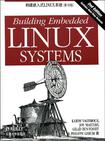构建嵌入式Linux系统
2009-4
东南大学出版社
亚荷毛尔
439
无
虽然很多公司将LINUX用于多种嵌入式系统,从手机到汽车ABS系统和水过滤设备,但是令人惊讶的是,关于LINUX系统内核和相关工具的建立、安装、测试这方面信息的资源几乎没有。 《构建嵌入式LINUX系统》是一本构造这些系统的详细指南,不仅可以学习基本原理,而且可以学习如何去配置、设置并使用40种以上不同的开发源码和自由软件包。 此次再版,更新了上一个版本的LINUX系统内核和之前无证程序的特征,以助你: ·建立自己的GNU开发工具链 ·选择、配置、构建并安装特定目标的内核 ·建立完整的目标根文件系统 ·设置、操作及使用固态存储设备 ·安装并配置目标的引导加载程序 ·交叉编译大量实用程序和包 ·使用多种工具和技术调试嵌入式系统 ·使用uClibc, BusyBox, U-Boot, OpenSSH, thttpd, tftp, strace和gdb包 ·利用Xenomai或RT内核补丁的实时特征 此次再版教授了如何构建操作系统组件,简化了嵌入式系统中令人望而生畏的完全控制的维护任务。
作者:(加拿大) 亚荷毛尔 (Yaghmour.K.)
Preface1.Introduction Definitions Real Life and Embedded Linux Systems Design and Implementation Methodology2.Basic Concepts Types of Hosts Types of Host/Target Development Setups Types of Host/Target Debug Setups Generic Architecture of an Embedded Linux System System Startup Types of Boot Configurations System Memory Layout3.Hardware Support Processor Architectures Buses and Interfaces I/O Storage General-Purpose Networking Industrial-Grade Networking System Monitoring4.Development Tools A Practical Project Workspace GNU Cross-Platform Development Toolchain C Library Alternatives Java Perl Python Other Programming Languages Eclipse: An Integrated Development Environment Terminal Emulators5.Kernel Considerations Selecting a Kernel Configuring the Kernel Compiling the Kernel Installing the Kernel In the Field6.Root Filesystem Content Basic Root Filesystem Structure Libraries Kernel Modules Kernel Images Device Files Main System Applications Custom Applications System Initialization7.Storage Device Manipulation MTD-Supported Devices Disk Devices To Swap or Not To Swap8.Root Filesystem Setup Filesystem Types for Embedded Devices Writing a Filesystem Image to Flash Using an NFS-Mounted Root Filesystem Placing a Disk Filesystem on a RAM Disk Rootfs and Initramfs Choosing a Filesystem's Type and Layout Handling Software Upgrades9.Setting Up the Bootloader Embedded Bootloaders Server Setup for Network Boot Using the U-Boot Bootloader10.Setting Up Networking Services Network Settings Busybox Dynamic Configuration Through DHCP The Internet Super-Server Remote Administration with SNMP Network Login Through Telnet Secure Communication with SSH Serving Web Content Through HTTP Provisioning11.Debugging Tools Eclipse Debugging Applications with gdb Tracing Performance Analysis Memory Debugging A Word on Hardware Tools12.Introduction to Real-Time tinux What Is Real-Time Processing? Should Your Linux Be Real-Time? Common Real-Time Kernel Requirements Some Typical Users of Real-Time Computing Technology The Linux Paths to Real-Time13.TheXenomai ReaI-TimeSystem Porting Traditional RTOS Applications to Linux The Xenomai Architecture How Xenomai Works The Real-Time Driver Model Xenomai, Chameleon by Design14.The RT Patch Interrupts As Threads Priority Inheritance Configuring the Kernel with the RT Patch High-Resolution Timers The Latency Tracer ConclusionIndex
“As We saw in the previous chapter,there is a rich variety of embedded Linux systems.Andas time moves torward,this diversity is increasing as new markets open up.be itfor the millions of Linux.based cell phones sold every year,or for experimental amateurrocKets with precise real.time requirements.In spite of such a variety,there are.nevertheless a few key characteristics that apply uniformly to most embedded Linuxsystems The purpose of this chapter is to present you with the basic concepts and issuesThat you are likely to encounter when developing any sort of embedded Linux system.Many ot the subjects introduced here will be discussed in far greater detail in 0therchapters.1 hey are covered here briefly to give you an understanding of how the systemtorms a cohesive whole,and to avoid So-called undeclared forward references(a pro-gram.mlng term tor using something before it has been fully defined).The chapter startsWith a discussion ot the types ofhosts most commonly used for developing embeddedLinux systems,the types ofhost/target development setups,and the types ofhost/targetdebug setups.These sections are meant to help you select the best environment fordeveloping embedded Linux systems or,if the environment is already specified,on-derstand how your particular setup will influence the rest of your development effort.Wewillthen present details of the structure commonly found in most embedded Linuxsystems,and the generic architecture of an embedded Linux system,explaining systemstartup,types ot boot configuration,and the typical system memory layout.in additionto other related items.
“这本书中没有关于常用工具或项目范围的任何假设。所需要的……就是下载必要包和浏览详尽在线文档的Internet连接,从而与其他开发者互享经验并从中获益。这些讲述不仅在设计上给予恰到好处的自由及控制,也紧承Linux嵌入式系统应用的开发先锋们的观点。” ——节自Preface
《构建嵌入式LINUX系统(影印版)》由东南大学出版社出版。

无
这本书,不同于linux kernel 编程, 也不同于linux 管理等,它从另一个角度阐述linux,告诉我们怎么从无到有的搭建出一个嵌入式linux环境出来。
linux嵌入式系统构建方面的好书
虽说是英文的,但是仔细看下去,这本书讲的还是很不错的。对嵌入式的系统方方面面对做了介绍。
Embedded Linux 书太多了,这本很好,要言不烦。我才拿到几天,已经发现书中对 Eclipse CDT
的说明对我大有帮助。
我强烈建议,programmer 要读原文书。新资料飞快的推出,不能等翻译。平时就读原文书,才能随时跟上新知。
自己的是中文版,建议朋友买的影印版。交流学习
昨天就到广州了,且今天早上九点多就已经寄出,到下班时间居然还收不到,下次估计也不会在当当上面来了,还有上面快递公司是 华南都市报,上面的电话上班时间打过去没人接,到了6点居然打不通。。。。。。。。
反正还没收到 ,已经到广州了 两天时间居然送不到。。。。。
国外经典书籍!还是原著的好!也能提高英语水平!学IT的英语水平不好,很难拔高技术!前沿技术都是国外的!强烈推荐!
很喜欢这几本书,会继续关注
开始看当当评论,有人说很好,也有人不建议买,于是去网上下了电子版的。粗粗看过一遍以后,发现其实写的挺好的,深受启发,于是买本书慢慢仔细看看。支持英文原版,印刷的质量看起来也还不错。
好像又点难度,依然非常喜欢
特意买了英文版,为了提高自己的专业英文水平。
中文版翻译得已经很不错了, 某些地方可以看看英文版,用英文的思路去理解一些事情的时候会觉得更加简单。
好书,英文版的,不像有一些人翻译的烂,读书,还是原版的好
至少作者的写作态度很端正
还可以吧,没看过还
英文版的看起来很爽,就是效率低了点
虽然是影印版,但是书本的效果还是挺好的
这本书还不错,还算满意,全英文的
英文的,没有看,写得挺多。
多休息运输管理,否则你就没生意了
适合初学者,通过这本书,可以对LINux框架有个大致的浅显的了解。理论为主,如果想要其他深入的知识,需要看其他的书籍。适合初学者!
买了,没用过,就搞应用开发了。
老外写的很中肯~~~~~~~~
讲2.6内核下的开发环境搭建,2.4的书就很好, 这本也不错.
这本很不错,不过看的有点费劲啊!这是英文的,呵呵。
没注意我买了英文的,如何换货
很不错,除了价格太贵,还不如自己打印 呵呵